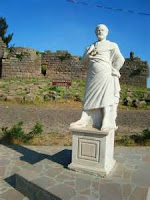Dear
Recep
cc MustafaKemal@atürk
 |
| Assos with view over to Lesbos |
 |
| Where has my statue gone? Assos garbage can |
 |
| Three Years Ago |
 There
is now no mention of me anywhere on the site. There is no Aristotle fridge
magnet on any tourist gizmo stall. I found only this garden gnome-like
mini-me outside an empty café, with no name inscribed.
What is going on? Are you so scared of intellectual debate and pre-Islamic history that you just delete them?
There
is now no mention of me anywhere on the site. There is no Aristotle fridge
magnet on any tourist gizmo stall. I found only this garden gnome-like
mini-me outside an empty café, with no name inscribed.
What is going on? Are you so scared of intellectual debate and pre-Islamic history that you just delete them?
I
wrote quite a bit of my Politics at
Assos, because Hermias wanted to reform his one-man rule (which we
used straightforwardly to call a tyranny instead of pretending it was a
democracy). Although I have now repudiated
my former prejudicial view of women, and see that slavery was indefensible, I
stand by most of what I wrote and think you need reminding of my
observations.
1. Tyrants
abuse religion to consolidate their power in the state.
2. Nobody
can expect to make money out of the community and to receive its respect as well.
3. States malfunction when there are no friendly partnerships in operation between
the individuals who constitute the state, only suspicion and envy.
4. Tyrants discourage any activities
amongst citizens which foster self-esteem and self-confidence. These activities
include academic work, the formation of study-circles and
other arenas for debate.
5. The
goal in a real democracy is liberty; your democracy sounds like my definition
of tyranny, where the goal is the autocrat’s personal self-protection.
6. As
I will explain in my work on Rhetoric, torture doesn’t work. Those subjected to
torture are as likely to give false evidence as true, while others are equally ready to
make false charges against others, in the hope of being sooner released from
torture.
 |
| Atatürk Birth Museum |
 You can come by ferry to Thessaloniki, where Mustafa Kemal Atatürk was born.
While you’re there you can visit the Atatürk Museum to be reminded of another,
very different vision of a modern Turkey.
You can come by ferry to Thessaloniki, where Mustafa Kemal Atatürk was born.
While you’re there you can visit the Atatürk Museum to be reminded of another,
very different vision of a modern Turkey.
Yours
sincerely
Aristotle
son of Nicomachus of Stagira.









